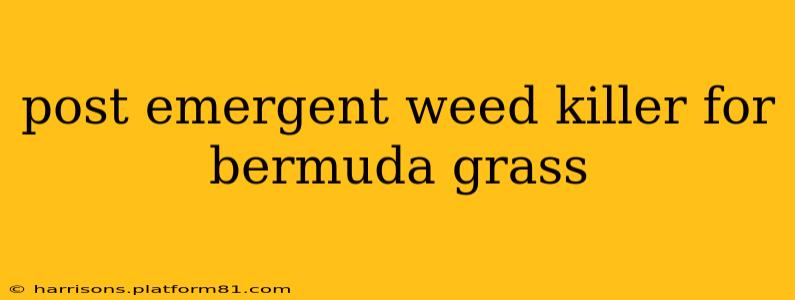Maintaining a lush, healthy Bermuda grass lawn requires diligent weed control. While pre-emergent herbicides prevent weeds from sprouting, post-emergent weed killers are crucial for tackling those pesky weeds that have already emerged. This guide will explore effective post-emergent weed control options for your Bermuda grass, addressing common concerns and providing expert advice.
What is Post-Emergent Weed Control?
Post-emergent weed control involves applying herbicides after weeds have germinated and become visible. This approach targets existing weeds, eliminating them without harming (ideally) your established Bermuda grass. The effectiveness depends on choosing the right herbicide for the specific weeds present and following application instructions carefully.
Choosing the Right Post-Emergent Herbicide for Bermuda Grass
Selecting the correct herbicide is critical. Some herbicides are broadleaf weed killers, targeting weeds with broad leaves, while others are grass-specific, eliminating grassy weeds. Since you want to protect your Bermuda grass, it's vital to choose a selective herbicide designed for broadleaf weeds in Bermuda lawns. Always read the product label carefully to ensure it's compatible with Bermuda grass.
Look for herbicides containing active ingredients such as:
- 2,4-D: A common ingredient effective against many broadleaf weeds.
- Dicamba: Another effective broadleaf herbicide often used in combination with 2,4-D.
- MCPP (Mecoprop): A hormone-type herbicide also targeting broadleaf weeds.
Important Note: Always check the specific weed species you're dealing with and select an herbicide that targets those specific plants. This ensures effective control without harming your desirable grasses.
How to Apply Post-Emergent Weed Killer to Bermuda Grass
Successful weed control relies on proper application:
- Identify the weeds: Accurately identifying the weeds will help you choose the most effective herbicide.
- Read the label thoroughly: Always follow the manufacturer's instructions precisely. This includes the recommended application rate, timing, and safety precautions.
- Prepare the area: Mow your lawn to a reasonable height before applying the herbicide. Avoid applying when rain is expected.
- Apply evenly: Use a hand-held sprayer or a garden hose attachment for even coverage. Avoid over-application, as this won't improve results and could damage your grass.
- Water appropriately: Check the herbicide's instructions for post-application watering recommendations. Some require watering after application, while others do not.
What are some common broadleaf weeds that affect Bermuda grass?
Common broadleaf weeds that invade Bermuda grass lawns include:
- Dandelions: Easily recognizable by their yellow flowers and serrated leaves.
- Clover: Characterized by its trifoliate leaves and small white or red flowers.
- Plantain: Has broad, oval-shaped leaves that grow close to the ground.
- Henbit: A winter annual with square stems and purple flowers.
- Chickweed: A low-growing weed with small, white flowers.
Choosing an herbicide effective against these specific weeds is key for optimal results.
What is the best time of year to apply post-emergent weed killer?
The best time to apply post-emergent weed killer depends on your region's climate and the specific weed species you're targeting. Generally, spring and fall are ideal times for many areas. However, always follow the herbicide label's instructions, as some herbicides are best applied during specific growth stages of the weeds. Applying during periods of active weed growth usually yields the best results.
Can I mix post-emergent weed killer with other lawn treatments?
Mixing post-emergent weed killer with other lawn treatments, such as fertilizers or insecticides, is generally not recommended unless specifically stated on the product labels. Mixing incompatible products can lead to reduced effectiveness or even damage to your lawn. Always consult the product labels and err on the side of caution.
What are the potential side effects of using post-emergent weed killer?
While selective herbicides are designed to minimize harm to Bermuda grass, potential side effects can occur if the product is misused or applied incorrectly. These could include temporary yellowing or browning of grass, especially in hot or dry conditions. Always follow the label instructions carefully to minimize these risks.
This information is for general guidance only and should not substitute professional advice. Always refer to the specific instructions on the herbicide product label before applying it to your lawn. If you have any doubts or concerns, consult a lawn care professional for tailored recommendations.
